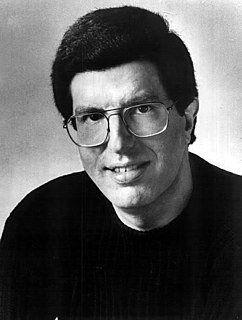A Quote by Richard Dawkins
Of course in science there are things that are open to doubt and things need to be discussed. But among the things that science does know, evolution is about as certain as anything we know.
Related Quotes
The whole point of science is that most of it is uncertain. That's why science is exciting--because we don't know. Science is all about things we don't understand. The public, of course, imagines science is just a set of facts. But it's not. Science is a process of exploring, which is always partial. We explore, and we find out things that we understand. We find out things we thought we understood were wrong. That's how it makes progress.
I believe in rendering to science the things that belong to science. I have no problem with evolution or discussions of the age of the Earth, for I don't believe that we come anywhere near comprehending the mind of God or the workings of the universe. Science can explain a lot, but it cannot give us faith, and I think we need both.
There are certain kinds of people who write science fiction. I think a lot of us married late. A lot of us are mama's boys. I lived at home until I was 27. But most of the writers I know in any field, especially science fiction, grew up late. They're so interested in doing what they do and in their science, they don't think about other things.
Science is like society and trade, in resting at bottom upon a basis of faith. There are some things here, too, that we can not prove, otherwise there would be nothing we can prove. Science is busy with the hither-end of things, not the thither-end. It is a mistake to contrast religion and science in this respect, and to think of religion as taking everything for granted, and science as doing only clean work, and having all the loose ends gathered up and tucked in. We never reach the roots of things in science more than in religion.
I don't like to claim that I am an expert on anything, but I have enough knowledge about climate science and climate system to be able to write scientific papers and go to meetings and talk about monsoon systems and talk about any other things that you want to discuss about climate science issues. I'm as qualified as anybody that you know on this planet on this topic.
You have to get autistic kids out and expose them to things, but do this without any surprises, so they know what to expect. You have to find skilled mentors to teach them things. For me, it was an aunt, and it was my science teacher. You need to find the things they're interested in and good at and expand on this.
At a certain point we need to grow up; we need to look inside ourselves for our inner guidance. There are things most human beings know; they just don't want to know them. They know deep down that certain things in their lives are working or aren't working, that certain parts of their lives are functional and others are dysfunctional. But sometimes, as human beings, we don't want to know what's not convenient. So we pretend not to know.
Most of what I do is science fiction. Some of the things I do are fantasy. I don't like the labels, they're marketing tools, and I certainly don't worry about them when I'm writing. They are also inhibiting factors; you wind up not getting read by certain people, or not getting sold to certain people because they think they know what you write. You say science fiction and everybody thinks Star Wars or Star Trek.
I don't think they understand it's as important as math and science. It rounds you out as a person. I think it gives you a love of certain things. You don't have to become the next great composer. It's just nice to have heard certain things or to have seen certain things. It's part of being a human being.
Yet things are knowable! They are knowable, because, being from one, things correspond. There is a scale: and the correspondence of heaven to earth, of matter to mind, of the part to the whole, is our guide. As there is a science of stars, called astronomy; and science of quantities, called mathematics; a science of qualities, called chemistry; so there is a science of sciences,--I call it Dialectic,--which is the Intellect discriminating the false and the true.





































